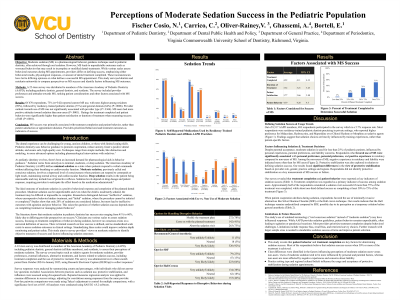Sedation
28 - Perceptions of Moderate Sedation Success in the Pediatric Population

- NF
Nicole Fischer Cosio, DDS (she/her/hers)
Pediatric Resident
Virginia Commonwealth University, Richmond, VA
Virginia Commonwealth School of Dentistry
Richmond, Virginia, United States - EB
Elizabeth Bortell, DDS
Virginia Commonwealth University Richmond, VA
Richmond, Virginia, United States - TW
Tiffany Williams, DDS, MSD
Program Director, Pediatric Dental Residency
Virginia Commonwealth University School of Dentistry, Department of Pediatrics
Richmond, Virginia, United States
Presenting Author(s)
Research Mentor(s)
Program Director(s)
Purpose
Moderate sedation (MS) is a pharmacological behavior guidance technique used in pediatric dentistry, often achieved through oral sedation. However, MS leads to unpredictable outcomes such as worsened behavior that may result in incomplete or modified dental treatments. While various scales assess behavioral outcomes during MS appointments, providers differ on defining success, emphasizing either behavioral results, physiological responses, or amount of dental treatment completed. These inconsistencies have led to differing opinions on what defines a successful MS appointment. This study surveyed dentists and residents nationwide to compare perspectives on MS success and identify factors influencing MS outcomes.
Methods
A 22-item survey was distributed to members of the American Academy of Pediatric Dentistry (AAPD), including pediatric dentists, general dentists, and residents. The survey included provider preferences and attitudes towards MS, ranking patient considerations and other factors associated with MS success.
Results
Of 470 respondents, 73% (n=342) reported current MS use, with rates highest among residents (89%), followed by residency-trained pediatric dentists (71%) and general dentists (64%) (P=.0006). Provider outlook towards use of MS was not significantly associated with provider type (P=.3364). MS users had more positive attitudes toward sedation than non-users (P < .0001). Ratings for treatment completed and patient behavior were significantly higher than patient satisfaction or duration of treatment when measuring success of MS (P < .0001).
Conclusion
MS success was primarily associated with treatment completion and patient behavior, rather than patient satisfaction or appointment duration. Providers prioritized behavioral and treatment outcomes as indicators of success.
Identify Supporting Agency and Grant Number: VCU IRB # HM20028855 was approved for this study

.jpg)